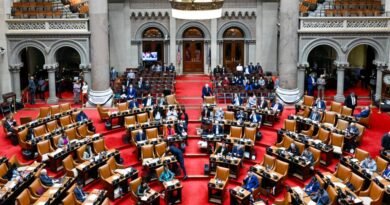Hochul’s Fracking Ban Prevents Access to $1 Trillion in Energy Resources

Hydraulic fracturing, commonly referred to as fracking, has turned the United States into a powerhouse of natural gas – with the exception of New York, where misguided leaders like Gov. Hochul persistently oppose harnessing the vast resources lying beneath our soil.
The U.S. energy surge is a result of two significant shale formations located throughout much of northeastern North America.
The relatively shallow Marcellus Shale stretches from West Virginia into New York’s Southern Tier region.
Below the Marcellus Shale is the Utica Shale, which potentially contains even larger amounts of natural gas, extending further northwest into Canada and eastward toward Albany — encompassing a considerable portion of the Empire State.
These two formations are projected to hold at least 500 to 1,000 trillion cubic feet (Tcf) of natural gas, dispersed across their expanse.
Determining the exact amount of gas within New York is challenging, but a study from the New York Energy Research and Development Authority estimates it could be between 160 and 300 Tcf — sufficient to satisfy the state’s entire natural gas demand for up to 300 years, based on current consumption.
At today’s market value, the reserves in New York could be worth as much as $1 trillion.
Instead of taking advantage of this economic opportunity, New York has allowed environmental alarmism to stifle its budding fracking industry, with a moratorium placed by Gov. David Patterson in 2008.
In 2014, Gov. Andrew Cuomo signed legislation banning fracking completely, which also effectively halted new natural gas pipelines that would have brought Pennsylvania’s affordable natural gas into New York.
Recently, Hochul intensified the opposition by signing a law prohibiting the use of carbon dioxide for fracking instead of water.
“We’re not fracking . . . we’re not going backwards,” she declared in September.
Fracking is a method of extraction that injects high-pressure liquids or gases into rock formations underground to release energy resources.
Environmental activists often cite various concerns against it, ranging from cancer fears to worries about water contamination, as well as sensational accounts of flaming faucets that have been largely debunked.
These activists have effectively stifled the industry in New York — despite the substantial benefits experienced by neighboring Pennsylvania.
Fracking has brought billions in economic gains to Pennsylvania.
Impact fees collected from drilling operations have provided over $2.7 billion to rural Pennsylvania communities since 2012 — funds that have contributed to new schools, housing projects, and economic initiatives in previously struggling towns.
To his credit, Pennsylvania Gov. Josh Shapiro has stood firm against the ongoing attempts by environmentalists to ban fracking in his state.
The natural gas sector in Pennsylvania accounts for hundreds of thousands of jobs: over 100,000 direct positions with drilling companies, according to a 2023 study, and several hundred thousand additional jobs in related industries — jobs supported by fracking company spending on goods and services as well as workers’ wages.
Moreover, fracking jobs are well-compensated.
A 2017 U.S. Bureau of Labor Statistics study estimated average wages of nearly $150,000 in today’s dollars.
By significantly boosting natural gas production, fracking in Pennsylvania has lowered energy costs for residents — applicable to both natural gas used for heating and electricity, much of which is generated using natural gas.
The average retail electricity price in New York was 50% higher than in Pennsylvania in 2023.
If New York could produce just half the natural gas that Pennsylvania does, statistics indicate that over 50,000 direct jobs could be generated, along with many additional indirect positions.
This would lead to substantial tax revenues, providing several hundred million dollars to Albany, along with over $100 million annually in impact fees for local communities.
A 2021 study by the U.S. Department of Energy found that a nationwide ban on fracking would cause a spike in energy prices, the loss of millions of jobs, and a nearly $1 trillion drop in wage income.
Such a ban would also raise national security concerns, making the United States reliant on expensive foreign sources of natural gas.
Despite its environmental challenges, fracking provides enormous advantages, not just through job creation and economic growth: Lower energy prices are an economic boost that decreases the costs of nearly all goods and services, while natural gas power plants have largely replaced more polluting coal-fired plants, resulting in a reduction in pollution and carbon emissions.
Yet, those opposing fracking seldom acknowledge these economic and environmental benefits.
As New York pursues its environmental goals amid increasing alarmism, it seems to neglect the economic well-being of its residents — particularly those in Upstate communities enduring decades of decline.
For years, fracking has provided a chance to reverse this downward trend by creating thousands of jobs, just as it has in Pennsylvania.
Unfortunately, New York Democrats, led by Hochul, have chosen to squander that opportunity.
While fracking alone cannot remedy New York’s economic strains, characterized by cumbersome regulations, high taxes, a generally unfavorable business environment, and unrealistic green energy ambitions, lifting the fracking ban would be a positive initial step.
Jonathan Lesser is a senior fellow with the National Center for Energy Analytics and the president of Continental Economics.



